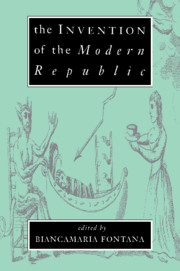Book contents
- Frontmatter
- Contents
- List of Contributors
- Acknowledgements
- Introduction: the invention of the modern republic
- 1 Ancient and modern republicanism: ‘mixed constitution’ and ‘ephors’
- 2 Checks, balances and boundaries: the separation of powers in the constitutional debate of 1787
- 3 From Utopia to republicanism: the case of Diderot
- 4 Cordeliers and Girondins: the prehistory of the republic?
- 5 The constitutional republicanism of Emmanuel Sieyès
- 6 The Thermidorian republic and its principles
- 7 Francesco Mario Pagano's ‘Republic of Virtue’: Naples 1799
- 8 Kant, the French revolution and the definition of the republic
- 9 French historians and the reconstruction of the republican tradition, 1800–1848
- 10 The republic of universal suffrage
- 11 The identity of the bourgeois liberal republic
- Bibliography
- Index
8 - Kant, the French revolution and the definition of the republic
Published online by Cambridge University Press: 05 February 2010
- Frontmatter
- Contents
- List of Contributors
- Acknowledgements
- Introduction: the invention of the modern republic
- 1 Ancient and modern republicanism: ‘mixed constitution’ and ‘ephors’
- 2 Checks, balances and boundaries: the separation of powers in the constitutional debate of 1787
- 3 From Utopia to republicanism: the case of Diderot
- 4 Cordeliers and Girondins: the prehistory of the republic?
- 5 The constitutional republicanism of Emmanuel Sieyès
- 6 The Thermidorian republic and its principles
- 7 Francesco Mario Pagano's ‘Republic of Virtue’: Naples 1799
- 8 Kant, the French revolution and the definition of the republic
- 9 French historians and the reconstruction of the republican tradition, 1800–1848
- 10 The republic of universal suffrage
- 11 The identity of the bourgeois liberal republic
- Bibliography
- Index
Summary
As the task of this volume has been defined, the major problem of ‘modern republicanism’ after Hobbes and Montesquieu is ‘how to link the idea, the project of a moderate, limited, non-despotic government with that of a popular/national sovereignty and of juridical equality (in a society without a king and aristocracy)’. Such a task was confronted by Montesquieu, Madison and Sieyès, as Pasquino and Manin have demonstrated, and arguably by Benjamin Constant and Madame de Staël, as Fontana has revealed. But as the earlier discussion has shown, there has been a real difficulty, historically, in making post-eighteenth-century theorists answer the questions that a modern republican theorist might wish to put to them. As might be expected, the forms of republicanism thrown up by the French revolution possessed, in practice, little direct precedent in theory. Furthermore, if we move outside the frontiers of France, it becomes particularly important to disentangle what it was in the complex sequence of events that sympathisers sympathised with – a problem made more difficult by the ubiquitous term, Jacobin, used and often accepted to describe all who expressed sympathy with the revolution. And it is a difficulty which particularly arises in the case of Kant, both at a superficial and at a deeper level.
At the superficial level, we have the testimony of his friends and contemporaries and of his European reputation in the 1790s. According to his friend Jachmann, he remained hostile to the anti-revolutionary crusade throughout the 1790s.
- Type
- Chapter
- Information
- The Invention of the Modern Republic , pp. 154 - 172Publisher: Cambridge University PressPrint publication year: 1994
- 4
- Cited by

